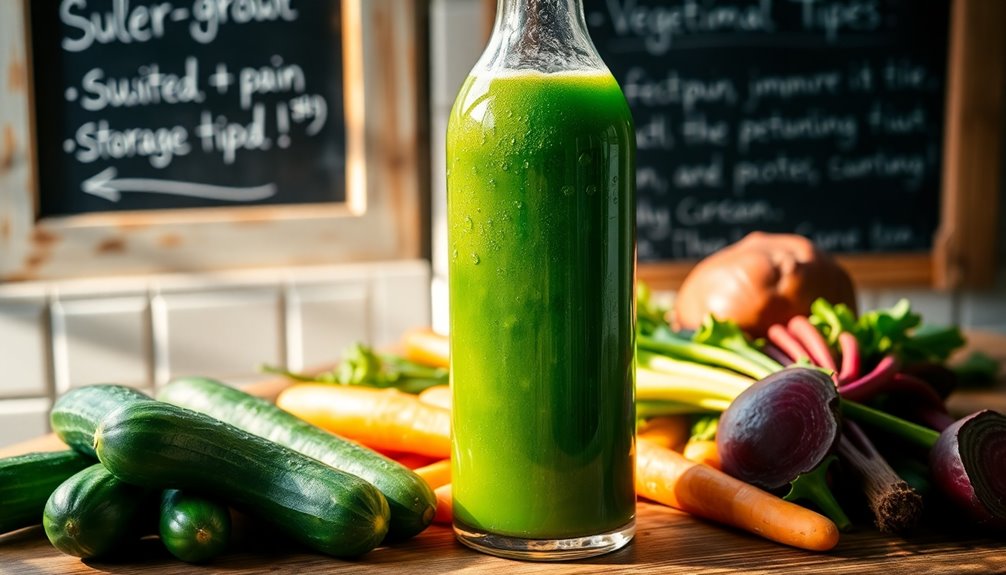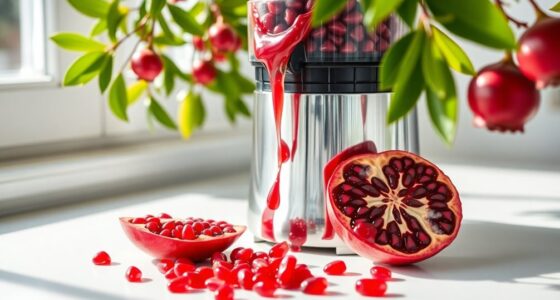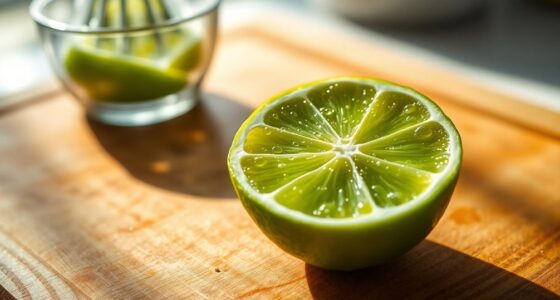Once you open vegetable juice, it usually lasts about 10 to 14 days in the fridge. To keep it fresh, make sure to store it in a tightly closed container. If you notice any off odors, unusual flavors, or mold, it's best to toss it out immediately. Proper storage can help maintain its quality, and there are ways to extend its life even further—stay tuned to learn more about those options!
Key Takeaways
- Opened vegetable juice lasts about 10 to 14 days in the fridge when stored properly.
- Keep the container tightly closed to maintain quality and freshness.
- Signs of spoilage include off odors, unusual flavors, and visible mold.
- Homemade vegetable juice should ideally be consumed within 24 to 72 hours.
- Freezing opened vegetable juice can extend its shelf life to 8 to 12 months.

Have you ever wondered how long vegetable juice really lasts? If you've just opened a carton of vegetable juice or made your own homemade version, you might be curious about its shelf life in the fridge. Understanding how to store vegetable juice properly can make a big difference in how long it stays fresh and tasty.
Once you open a container of vegetable juice, it's crucial to keep it stored properly. Typically, opened vegetable juice can last in the fridge for about 10 to 14 days. To ensure it maintains its quality, you should always keep the container tightly closed and continuously refrigerated. This minimizes exposure to air and light, both of which can contribute to spoilage.
If you notice any off odors or flavors, or if you see mold developing, it's time to discard the juice. These are all signs that the juice has gone bad and is no longer safe to consume.
If you've made homemade vegetable juice, the timeframe is a bit shorter. Usually, you should consume homemade vegetable juice within 24 to 72 hours, depending on the type of juicer you used. Freshly made juice doesn't contain preservatives, which means it's more susceptible to spoilage. To ensure you enjoy the best flavor and nutritional benefits, it's wise to drink it as soon as possible after juicing.
Are you wondering how to extend the shelf life of your vegetable juice? Freezing is an excellent option! If you've opened a carton and can't finish it within the recommended time, consider freezing it. Opened vegetable juice can be frozen for up to 8 to 12 months.
However, once you thaw it, you should aim to consume it within 3 to 5 days for the best quality. While freezing can significantly extend the life of the juice, keep in mind that the texture and taste may change slightly once you thaw it.
When it comes to storing vegetable juice, quality matters. Always check the expiration date on your store-bought juice before opening it, and try to consume it within the suggested time frames once opened. The fresher the juice, the better it's for your health and taste buds.
Frequently Asked Questions
How Long Is Vegetable Juice Good in the Fridge?
When you store opened vegetable juice in the fridge, it stays good for about 10 to 14 days if you keep it in an airtight container.
To ensure its quality and safety, make sure it stays continuously refrigerated.
Keep an eye out for any off odors, strange flavors, or mold, as these are signs of spoilage.
If you notice any of these, it's best to discard the juice immediately.
How Long Can You Keep Juice After Juicing?
"You can't rush quality." When it comes to homemade vegetable juice, you'll want to drink it soon after juicing for the best taste and nutrients.
If you use a centrifugal juicer, aim to sip it within 24 hours. Masticating juicer juice can last up to 48 hours, while twin gear juicer juice remains fresh for 4 to 5 days.
For longer storage, consider freezing it, which can keep quality for 8 to 12 months.
How Long Can You Keep Fresh Celery Juice in the Fridge?
You can keep fresh celery juice in the fridge for about 24 to 72 hours if you store it properly in an airtight container.
For the best taste and nutrient retention, drink it within the first 24 hours.
If you want to extend its shelf life, add a bit of lemon juice; it helps preserve the juice.
Always check for off odors or flavors before consuming it after a day.
How Long Can You Keep Fresh Juice in a Mason Jar?
You can keep fresh juice in a mason jar for about 10 to 14 days if you store it properly.
Make sure the jar is tightly sealed and kept in the fridge. For the best taste and nutrients, try to drink it within the first 24 hours after juicing.
If you fill the jar to the brim, it'll minimize air exposure, helping to keep your juice fresh longer.
Always check for spoilage before drinking!
Conclusion
In conclusion, vegetable juice can last about 3 to 5 days in the fridge, but freshness is key for taste and nutrition. Think of it like a vibrant sunset—beautiful at first but fading quickly. Just like you wouldn’t want to miss that stunning view, don’t let your juice go to waste. Enjoy it while it’s fresh, and savor every sip for the best flavor and health benefits. A little preparation goes a long way! To maximize the lifespan of your juice, consider proper storage techniques. Learn how to store fresh carrot juice by keeping it in an airtight container to prevent oxidation and retain its vibrant color and nutrients. Remember, consuming it soon after making enhances its fresh taste and your overall enjoyment!
Cindy thoroughly researches juicing trends, techniques, and recipes to provide readers with practical advice and inspiration. Her writing style is accessible, engaging, and designed to make complex concepts easy to understand. Cindy’s dedication to promoting the advantages of juicing shines through her work, empowering readers to make positive changes in their lives through the simple act of juicing.











